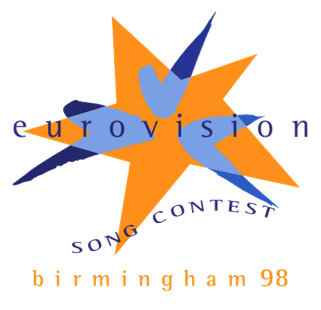1998 Eurovision Song Contest
| Eurovision Song Contest 1998 | |
|---|---|
 |
|
| Dates | |
| Final | 9 May 1998 |
| Host | |
| Venue | National Indoor Arena, Birmingham, United Kingdom |
| Presenter(s) | |
| Conductor | Martin Koch |
| Director | Geoff Posner |
| Executive supervisor | Christine Marchal-Ortiz |
| Executive producer | Kevin Bishop Jonathan King |
| Host broadcaster | British Broadcasting Corporation (BBC) |
| Opening act | Birmingham, Old and New |
| Interval act | Jupiter, The Bringer of Joviality |
| Participants | |
| Number of entries | 25 |
| Debuting countries |
|
| Returning countries | |
| Withdrawing countries | |
| Vote | |
| Voting system | Each country awarded 12, 10, 8–1 points to their 10 favourite songs |
| Nul points |
|
| Winning song | |
The Eurovision Song Contest 1998 was the 43rd annual Eurovision Song Contest. The contest took place in Birmingham in the United Kingdom, following Katrina and the Waves's win in the 1997 contest in Dublin with "Love Shine A Light". It was the UK's fifth win, and the eighth time that the UK hosted the contest, the last being in Harrogate in 1982. The UK has not won or hosted the contest since. The contest took place in the National Indoor Arena on 9 May 1998, and the city played host to the G8 summit one week later, with commentator Terry Wogan's hotel room subsequently being occupied by Bill Clinton. Twenty-five countries participated in the contest, with Macedonia making their official debut, even though they had submitted an entry in the non-televised 1996 pre-qualifying round, which failed to qualify into the televised final of that contest.Belgium, Finland, and Slovakia returned to the contest after a one-year absence. Despite having also taken part in the non-televised 1996 pre-qualifying round, in which they failed to qualify, Romania and Israel returned officially after their last participations in 1994 and 1995 respectively.Austria, Bosnia and Herzegovina, Denmark, Iceland, Italy, and Russia all withdrew from the contest due to the relegation rule. Italy did not return until 2011.
...
Wikipedia


